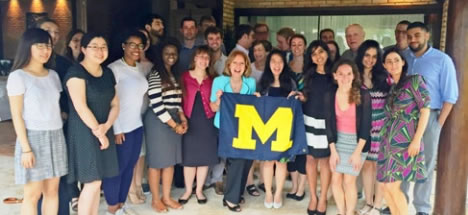By Miriam Wasserman
International economic development students with U.S. Ambassador to Brazil Liliana Ayalde (center front, holding U-M flag) 
For the students of PubPol 674, the Ford School’s international economic development course, a spring break trip to Brazil was anything but a guided tour. And yet, they couldn’t have asked for a more knowledgeable escort.
During his 35-year career in the U.S. Foreign Service, their faculty advisor Melvyn Levitsky was executive secretary of the State Department under Secretary of State George Shultz, spent three early years as a U.S. Foreign Service officer (two at a consulate up the Amazon and one in Brazil’s capital) and, 25 years later, served as U.S. Ambassador to Brazil.
As a faculty advisor to the International Economic Development course, however, Levitsky faced new challenges—to advise and guide students interested in Brazil’s unique economic and social development challenges, without taking over their mission. Now in its 15th year, the International Economic Development Program (IEDP) course was specially designed to be planned and administered by students.
Course Design
Students begin by selecting an emerging market country to study and finding a Ford School faculty member willing to advise their class. They then develop the course content, and complete all of the administrative and logistical tasks necessary to undertake a productive, policy-relevant trip to the country over spring break— from raising the $50,000 generally required for roughly two dozen students to travel to an emerging market country, to coordinating transport, accommodations, and meetings with in-country stakeholders.
Having a former ambassador as faculty advisor comes in handy when there are many ways in which the trip resembles a diplomatic mission. Ambassador Levitsky encouraged the students to define clear objectives, to establish relationships with contacts and organizations, and to match their objectives to their agenda.
All of this was particularly important because after the trip, students were required to produce real deliverables: they presented the results of their research in a report at a public symposium, they wrote a case study for the William Davidson Institute in return for the institute’s funding, and this year, they were tasked with finding a Brazilian organization willing to host a policy intern for a new summer internship sponsored by the Ford School’s International Policy Center.
Coordinating the right meetings to attain these goals was no easy task. The trip involved only a week of real working days, spread over two cities: Brasilia and Rio de Janeiro. Students, separated into five policy groups, arranged meetings with a wide variety of Brazilian government officials, NGO and civil society leaders, university researchers, and think tank analysts. And it didn’t hurt that Levitsky was able to arrange for a Saturday briefing with U.S. Embassy officers, hosted at the U.S. Ambassador’s official residence in Brasilia.
“Proper preparation prevents pretty poor performance,” Levitsky says—something he used to hear from his former boss, U.S. Secretary of State James Baker. For this class, that preparation involved defining timely research questions that the students could explore in-depth on the trip. They were advised in this respect by Levitsky and Professor Elisabeth Gerber, who accompanied the class on the trip.
Defining Issues
For Brendan Hall, who is pursuing a dual degree from the Ford School and the School of Natural Resources and Environment, that actually meant redirecting his focus. When he signed up for the course, Hall was hoping to study forestry or agricultural issues. Instead, his group chose to focus on Rio’s implementation of the Global Protocol for Cities, a program to measure greenhouse gas emissions as a baseline to set carbon reduction goals and check on their progress.
The shift in focus made sense for a number of reasons. First, it was a well-defined policy issue that could be explored within the scope of the trip. Second, Rio has been an early test-run of this global initiative and, as such, has been at the vanguard of its implementation. Finally, it’s an important policy challenge, as cities are the largest source of energy-related carbon-dioxide emissions.
“Deforestation-based emissions in Brazil have gone down by a whole lot and energy related emissions have been on an uptick,” says Hall, “so we felt it was more relevant to look at energy emissions—especially because Brazil’s emerging market economy is representative of many emerging market economies and the urbanization that is happening around the world.”
Exercising Diplomacy
Once students had defined their objectives and established key contacts in Brazil, they needed to exercise diplomacy in phrasing their questions, given the controversial nature of some of the policy topics they were studying.
“They are going to try to get the information in a way that is productive but pointed,” Levitsky explained before the trip. For instance, students examined the $8.5 billion Morar Carioca program—a massive economic development initiative planned as a lasting legacy of the 2016 Rio Olympics. Controversy has followed the program’s delayed implementation, so students planned meetings with representatives of the mayor’s office—for whom this is a signature program—and representatives from some of the community organizations who have complained about long program delays.
“Our hope is not to be antagonistic, but to find out: if this program hasn’t gone as exactly planned, what are the reasons for that?” Rory Pulvino (MPP/JD ’16) explained.
In the end, the students not only gained in-depth knowledge of highly specific policy challenges relevant to Brazil and other emerging market countries but, in the process, gained diplomatic and practical skills that will transfer to many other areas of a professional career. “I didn’t take the class to learn about time management, people management, designing logistical trainings, and making sure that people carry through with things,” said Pulvino. But the experience has been “definitely worth it for that.”
Rory Pulvino is a 2014 Dow Sustainability Fellow.
Below is a formatted version of this article from State & Hill, the magazine of the Ford School. View the entire Spring 2015 State & Hill here.
More news from the Ford School